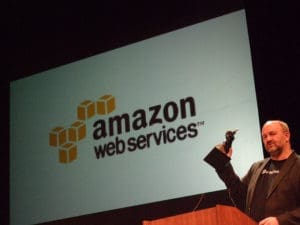 Microsoft is considered a cloud success story, as well it should, given its numbers in the most recent quarterly earnings report, but dollars don’t tell the whole story in the cloud market. It’s a big market, and revenue depends on how much you charge.
Microsoft is considered a cloud success story, as well it should, given its numbers in the most recent quarterly earnings report, but dollars don’t tell the whole story in the cloud market. It’s a big market, and revenue depends on how much you charge.
If Satya Nadella went to the mirror on the wall and asked who was the most successful cloud company of them all, he wouldn’t hear his company’s name. The mirror would plainly tell him that AWS was the fairest of them all and point to some data from the Synergy Research Group.
The most recent data that came out last week, shows that in spite of the great strides Microsoft has made in recent years in the cloud market, it owns 11 percent of market share, or about one third of AWS’s. In fact, you could throw Microsoft, Google, and IBM together, and you would still come up with just 23 percent combined, compared with AWS’s 34 percent market share.
As Microsoft, Google, Oracle, Alibaba, and others continue to chase AWS, we will continue to be dazzled by the big numbers they are reporting and their huge growth rates, but in spite of being well ahead of the pack, AWS has also managed to continue to grow at a fairly brisk pace.
Maybe it’s not doubling its revenue like Google and Microsoft, but it reported $4.1 billion in revenue, which means it grew at a respectable 42 percent year over year.
The pie is still expanding
As long as the pie continues to expand, Microsoft and the other AWS competitors will continue to rake in the cloud dollars. That expansion should continue for some time. Estimates range that somewhere between 5 and 20 percent of the world’s computer workloads are running in the cloud. That means there’s a lot of computing still being done inside private data centers.
It also means that there is plenty of market left for the taking. In an interview last year, AWS CEO Andy Jassy wondered why it took the competition so long to get started. As he said at the time, the companies he’s competing with now looked for every reason not to get started:
“First, they said no one will use it, then maybe only startups will use it — but they won’t use it for anything real. Then it was enterprises will never use it, then enterprises will never use it for anything mission critical,” Jassy said in the interview.
But he also acknowledged there was plenty of room left in the market for multiple winners.
“There won’t be just one successful player. There won’t be 30 because scale really matters here in regards to cost structure, as well as the breadth of services, but there are going to be multiple successful players, and who those are I think is still to be written.”
It’s becoming clearer who those names are going to be, but whether anyone can actually catch AWS at this point, remains to be seen. For now, it’s the undisputed market leader, and even Microsoft doesn’t represent a significant threat.
Photo: Andrew Mager on Flickr. Used under CC by SA 2.0 license
